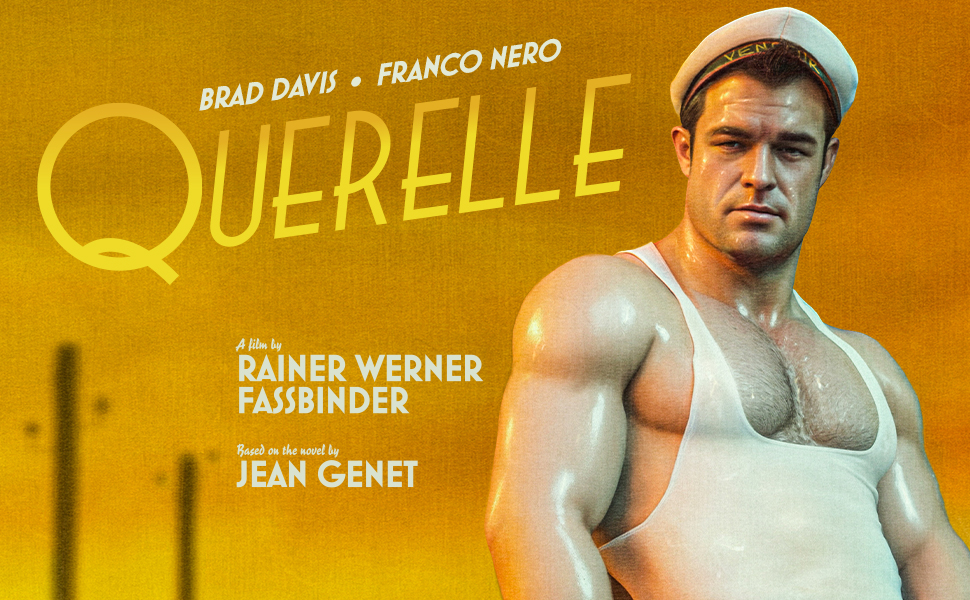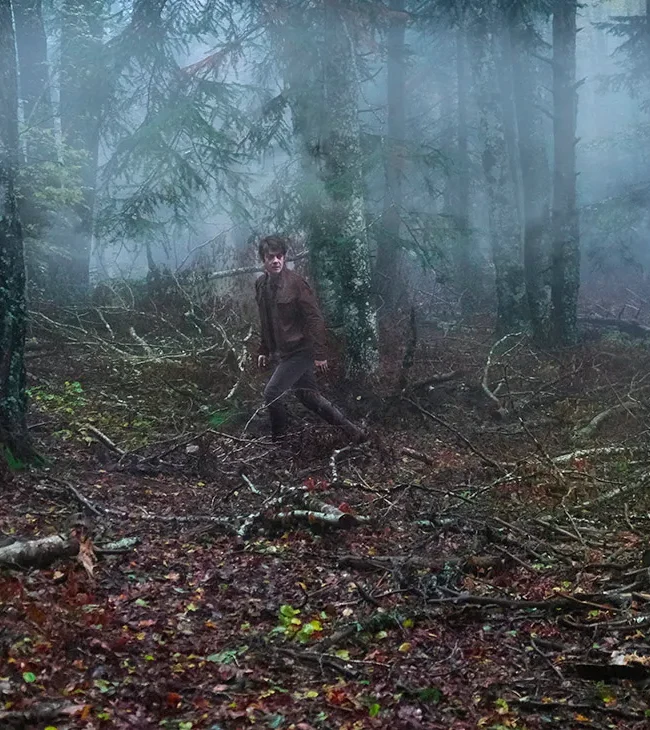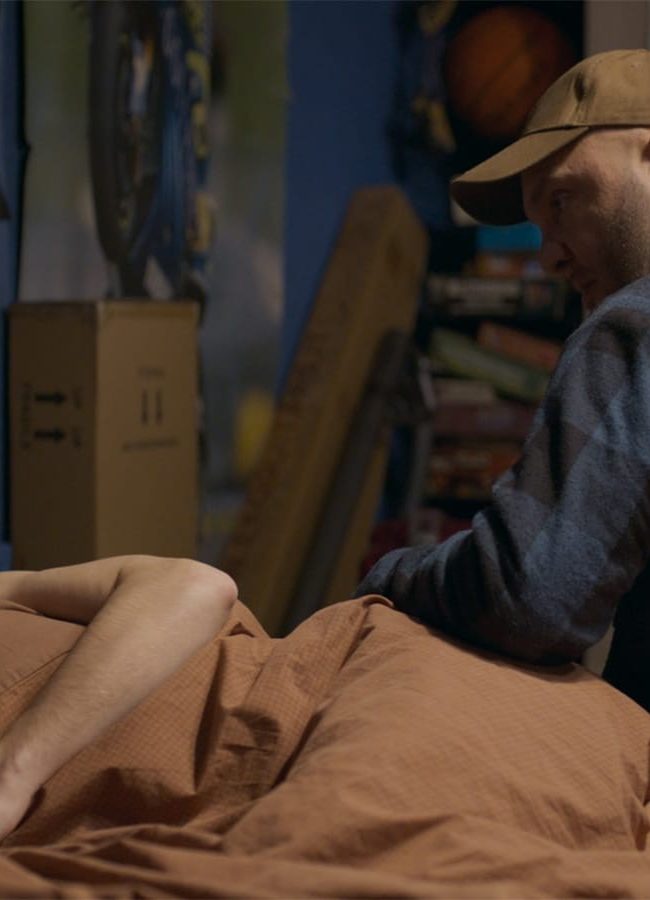THE CURBSIDE CRITERION: QUERELLE

(Here at Hammer to Nail, we are all about true independent cinema. But we also have to tip our hat to the great films that continue to inspire filmmakers and cinephiles alike. This week, Jonathan Marlow takes a journey with the flawed but intriguing the Criterion 4k Blu-Ray release of the Rainer Werner Fassbinder queer cinema touchstone, Querelle.)
A career-coda for any filmmaker carries an unnecessary and often unintended weight. Occasionally, the end is by choice or manufactured—the forthcoming My Last Movie (if that is ultimately what it is titled) by Alex Cox, for instance, or the long-gestating Megalopolis, perhaps—and, other times, the end is thrust upon the ‘maker by film-financiers and/or studios (Robert Wise, for instance, had no particular desire for Rooftops to be his final effort but failed to secure funding for another feature-length for theatrical release). The common tendency to equate finality with “magnum opus” as if such a work is inevitably the summation of a career, building into a tidy package everything that preceded that work, can have unfortunate consequences. This is particularly true of Querelle, a seemingly inevitable pairing of polysexual writer/director/occasional actor Rainer Werner Fassbinder and gay author/playwright Jean Genet. The film, a French/German co-production, post-sync’ed in English with French, American, German and Italian actors, is surrealistically opulent, with a richly-limited colour-palette later lifted (figuratively) for Guy Maddin’s Careful with similarly claustrophobic affect. [Long-time RWF cinematographer Xaver Schwarzenberger signed-off on the exquisite high-definition master of this Blade-Runner-wide 2.35 Criterion Collection release.]
Fassbinder, as most critics are evidently obliged to remind, was a substantial part of the Neuer Deutscher Film (“New German Cinema” or “German New Wave”) cluster of individuals which included Werner Herzog and Wim Wenders and well as Werner Schroeter (who was originally going to direct Querelle), Margarethe von Trotta, Alexander Kluge, Hans-Jürgen Syberberg and a handful of others. Given its German-ness, there is a manifesto (no less) whereby the founders (of which the aforementioned, outside of Kluge, aligned later) stated, “Der alte Film ist tot.” [“The old (or conventional) cinema is dead.”] “Wir glauben an den neuen.” [“We believe in the new cinema.”] As one will and should.
Queer—in all meanings of the word—Querelle became the prolific Fassbinder’s final work when his life was cut-short prematurely. He wasn’t the only participant in the production to die far too young, unfortunately: the actor portraying the titular anti-hero, Brad Davis, passed from an AIDS-related assisted suicide in the early-1990s. It is a challenge, admittedly, to get much of a read for Davis’ capabilities as an actor—or, for that matter, Franco Nero or Jeanne Moreau or anyone else in the cast—from this lone performance. Describing RWF’s Brechtian directorial style as “flat” is arguably too generous for the acting on display. This is by design (although generally off-putting for many viewers) yet it attempts to arrive at a non-documentary “ecstatic truth” (in Herzogian-speak).
Not unlike Alfred Hitchcock’s Rope—queer actors in queer subject-matter (a retelling of the Leopold/Loeb murder)—supplemented by a queer screenwriter [Arthur Laurents] and queer composer [Francis Poulenc, whose Mouvement Perpétule no.I Farley Granger “plays” throughout the film], Querelle has Peer Rabin for its scoring, even setting an Oscar Wilde poem to music. Granted, “Each Man Kills the Thing He Loves” as sung by Jeanne Moreau is terrible enough that the soundtrack was nominated for a Razzie [Golden Raspberry] award for “Worst Musical Score” (which it lost, justifiably, to the Pia Zadora travesty The Lonely Lady). [If you’re needing a great page-to-tune version of the Wilde poem, seek-out Gavin Friday’s song-of-the-same-name from his solo-album-of-the-same-name. Rather lovely, indeed.]
With Genet’s Querelle de Brest as a framework, the sailor and petty-criminal of the title arrives on Le Vengeur [“the Avenger”] at the novel-named port, having already inspired unrequited ongoing obsession in the captain, Lieutenant Seblon [Nero]. His Obscure Object of Desire, if you will. Querelle’s estranged brother, Robert [Hanno Pöschl], lives in-town and is romantically involved with the local madam, Lysiane [Moreau]. Her husband, Nono [Gunther Kaufman], is the brothel-owner and town “fixer” who arranges, at Querelle’s behest, an opium deal that sets in-motion an assortment of pair-ups and double-crosses. The most consequential of these is an affair with a dock-worker, on the lam for killing his colleague. In disguise, he bears a more-than-passing resemblance to Querelle’s brother (which is little wonder since they’re both played by the same actor). The hatred Querelle has for Robert is equal to the passion he feels—or, at least, physically displays—for Gil. Confusion and copulation follow, naturally.
What took Fassbinder until the 1980s to adapt Genet? His own scripts for In the Year of 13 Moons and Fox and His Friends point in the general direction although both are more story-oriented than this conclusion. Derek Jarman was covering his own similarly-themed territory in England at this time with Sebastiane, Jubilee and The Angelic Conversation over these parallel years. To remarkable effect, as was the wonderful work of Ulrike Ottinger in Germany and Chantal Akerman in Belgium, France and elsewhere.
The plot, however, bears little adherence to traditional narrative logic. Where are we? A port in Brest? We are quite obviously on a soundstage, a la One From the Heart. The film wants you to know that this is a phallic-filled simulacrum of reality and not much more. When are we? Is this the late-1940s when the novel was initially published or some earlier era when port-economies were reliant on ships sailing seaside for brief visits or is this some other time entirely, with Kenneth Anger-esque celebrations of biker-culture—a disreputable police officer who spends his afternoons lulling at Lysaine and Nono’s establishment is a none-too-subtle leather-boy, for instance—amongst circa-1980s cabinet arcade games. Therein, the setting is consequentially no time at all. No real time, at any rate, but still a product of the time of its creation. There is an evident Tom of Finland esthetic in the portrayal of these sailors (which Astra Zero enhances to nth proportions in the new cover-art for this release) which further adds to its time-less qualities. Such a film would not—nor could not—be made today.
If nothing is real, why should a viewer get emotionally invested in whatever becomes of these characters over its not-quite-two-hour running-time? In its posthumous release—RWF died during the editing process of the film—Querelle was not considered a success. Its sex scenes are fairly timid by contemporary standards. It is not the greatest work of any of the participants and yet it does not fail to fascinate. “Mainstream” gay filmmaking, in the wake of Death in Venice (1971), arguably, served as an essential preamble to the New Queer Cinema of Isaac Julien, Todd Haynes, Gregg Araki and others in the decades thereafter, or a parallel pre-NQC in the works of John Waters, Arthur Bressan Jr. and Wakefield Poole or post-NQC of the nonfiction variety with Jenni Olson and Yance Ford, albeit with too few films of equal merit in recent years (much of which worth mentioning can be found in the works of Céline Sciamma, Alain Guiraudie and a handful of others). Let there be more. More, yet never quite enough.
QUERELLE
dir. Rainer Werner Fassbinder [108min.] Gaumont | Criterion Collection
– Jonathan Marlow (@aliasMarlow)











